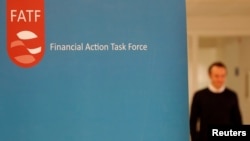The United Kingdom’s decision to add Pakistan to its list of “high-risk countries” for money laundering and terror financing may make it harder for Islamabad to exit the Financial Action Task Force (FATF) “gray list” in June, experts warn.
On April 12, the U.K. included Pakistan among 21 countries that have failed to stop illegal wealth transfers because of lax fiscal monitoring.
Pakistan’s government spokesperson Iftikhar Chaudhry told VOA the action by London was an “insult” by putting Islamabad among the “weak and nonfunctioning” governments.
Experts say since Brexit, British officials strengthened anti-money-laundering laws to define a high-risk country as one where banks need to do due diligence before accepting foreign transactions.
“This kind of action could conceivably persuade FATF not to allow Pakistan to exit from its gray list,” said Zubair Iqbal, a Washington-based researcher at the Middle East Institute and a former International Monetary Fund official.
The FATF, an intergovernmental organization fighting money laundering and terrorism financing, placed Pakistan on its gray list of countries with inadequate controls over terrorism financing in 2018. Financial experts say the designation has cost the country billions of dollars in lost investment and trade.
Banned groups
British High Commissioner Christian Turner last week met Pakistani Interior Minister Shaikh Rashid in Islamabad and commended Pakistan for its progress in meeting 24 out of 27 of FATF’s action items for the country.
Since Pakistan was placed on the gray list, the U.S., U.K., France and Germany have prodded Islamabad to rein in extremists and the thinly veiled groups that finance them.
Pakistani officials insist they are making progress.
“Pakistan is not an extremist-minded state,” Rashid said April 14, as he announced a ban on the extremist group Tehreek-e-Labaik (TLP).
The TLP recently demanded that Pakistan expel the French envoy over last year’s publication of cartoons depicting the Prophet Muhammad. The government debated TLP’s demands in Parliament, ending its session after failing to reach consensus with the opposition.
FATF’s remaining three items require Pakistan to effectively prosecute terrorists and stop banned groups from reregistering under new names to collect donations.
Anjuman Sipah-i-Sahaba Pakistan, designated by the United Nations as a terrorist group in 2002, reregistered as Ahl-i-Sunnat Wal Jamaat in 2008 to contest elections. The militant Laskar-i-Tayyab, banned the same year, reregistered as Jamaat ud Dawa to collect donations for Kashmir.
Money laundering
While Pakistan’s progress on tackling Kashmiri militant groups has been sluggish, its actions against money laundering are commendable, said Shahid Hasan Siddiqi, chairman of the Karachi-based Research Institute of Islamic Banking and Finance.
Siddiqi told VOA that Pakistan has “substantially” reduced its $10 billion annual losses in money laundering identified in 2017 by the U.S. State Department’s International Narcotics Strategy Report. Pakistan’s bank remittances grew by 43% this year, “partly due to COVID,” but also because more foreign transfers were made through banks, he said.
Chaudhry said Britain needed to recognize Pakistan for discouraging the traditional network of money brokers — known as hundi — and rediverting cash through traditional banking channels.
"We managed to achieve 24 out of 27 items recommended in FATF, and this was acknowledged by its chairman, Dr. Marcus Pleyer,” he added.
Corruption hurdle
Some officials believe the U.K.’s decision to add Pakistan to the list of high-risk countries may be related to the country’s increasing scrutiny on suspicious funds coming into the U.K.
On Monday, British Foreign Secretary Dominic Raab told Parliament that sanctions would be levied against individuals who use the U.K. as a “honey pot” to transfer ill-gotten wealth from their respective countries.
In a high-profile case in 2019, a Pakistani business tycoon forfeited $264 million in assets to the British government in a money-laundering probe. The businessman, Malik Riaz, paid the funds without admitting guilt. The money was returned to Pakistan, but Riaz was never prosecuted.
Moin Khan, a London criminal duty solicitor, told VOA that Pakistan’s failure to prosecute Riaz worsened the perception that the government is not serious about cracking down on corruption.
Chaudhry rejected the criticism and told VOA that Riaz was prosecuted.
“Riaz’s business partner, a parliamentarian, told me, ‘We are forced to pay a 2.5 billion-rupees fine [$16 million] every month, and it is creating a financial crisis for us.’”
However, that fine appears to be related to a 2018 Pakistan Supreme Court ruling on a property dispute.
London journalist Fareed Qureishi said Pakistani government officials never spoke openly about the Riaz case, even though they provided extensive details about how former Prime Minister Nawaz Sharif and former Finance Minister Ishaq Dar parked illegal wealth assets in the U.K.
“For a government which was voted in to bring back wealth looted by previous rulers, it feeds the narrative there is selective accountability in Pakistan,” Qureishi said.




